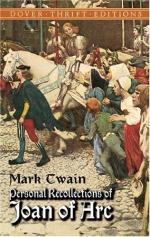In the field the Dwarf had no assignment; that is to say, he was not under orders to occupy any particular place, therefore he chose his place for himself, and went ahead of Joan and made a road for her. It was horrible to see the iron helmets fly into fragments under his dreadful ax. He called it cracking nuts, and it looked like that. He made a good road, and paved it well with flesh and iron. Joan and the rest of us followed it so briskly that we outspeeded our forces and had the English behind us as well as before. The knights commanded us to face outward around Joan, which we did, and then there was work done that was fine to see. One was obliged to respect the Paladin, now. Being right under Joan’s exalting and transforming eye, he forgot his native prudence, he forgot his diffidence in the presence of danger, he forgot what fear was, and he never laid about him in his imaginary battles in a more tremendous way that he did in this real one; and wherever he struck there was an enemy the less.
We were in that close place only a few minutes; then our forces to the rear broke through with a great shout and joined us, and then the English fought a retreating fight, but in a fine and gallant way, and we drove them to their fortress foot by foot, they facing us all the time, and their reserves on the walls raining showers of arrows, cross-bow bolts, and stone cannon-balls upon us.
The bulk of the enemy got safely within the works and left us outside with piles of French and English dead and wounded for company—a sickening sight, an awful sight to us youngsters, for our little ambush fights in February had been in the night, and the blood and the mutilations and the dead faces were mercifully dim, whereas we saw these things now for the first time in all their naked ghastliness.
Now arrived Dunois from the city, and plunged through the battle on his foam-flecked horse and galloped up to Joan, saluting, and uttering handsome compliments as he came. He waved his hand toward the distant walls of the city, where a multitude of flags were flaunting gaily in the wind, and said the populace were up there observing her fortunate performance and rejoicing over it, and added that she and the forces would have a great reception now.
“Now? Hardly now, Bastard. Not yet!”
“Why not yet? Is there more to be done?”
“More, Bastard? We have but begun! We will take this fortress.”
“Ah, you can’t be serious! We can’t take this place; let me urge you not to make the attempt; it is too desperate. Let me order the forces back.”
Joan’s heart was overflowing with the joys and enthusiasms of war, and it made her impatient to hear such talk. She cried out:
“Bastard, Bastard, will ye play always with these English? Now verily I tell you we will not budge until this place is ours. We will carry it by storm. Sound the charge!”
“Ah, my General—”




